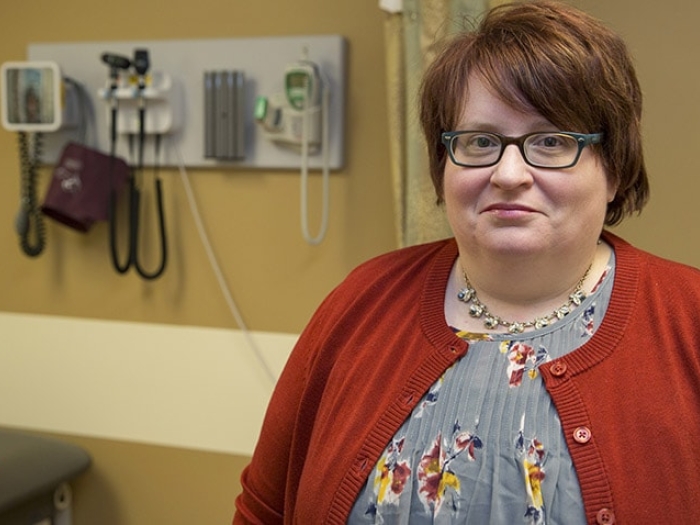A diagnosis of MS comes with many questions. A U-M neurologist answers some of the common ones.
1:00 PM
Author |

Multiple sclerosis, an inflammatory disease of the central nervous system, including the brain, spinal cord and optic nerves, is the most common cause of nontraumatic neurological disability among young adults in the Western Hemisphere. It can cause problems with muscle control, vision, balance, speaking and thinking, among other functions.
SEE ALSO: How Therapy Animals Help Those with Dementia
Because the disease can strike anywhere in the central nervous system, the symptoms that MS patients experience are diverse. The frequency and severity of MS attacks are unpredictable and can differ widely from one person to another. Symptoms often overlap with those of other nerve disorders, sometimes delaying diagnosis.
Amid the confusion — and, at present, the lack of a cure — is a growing clarity.
"Although we do not have all the answers regarding the causes of MS, doctors understand the disease process better today than ever before," says Benjamin Segal, M.D., a professor of neurology at the University of Michigan and the director of the Multiple Sclerosis Center and the Holtom-Garrett Program in Neuroimmunology at U-M. "I am hopeful that further progress will be made in the foreseeable future, particularly in treating progressive forms of MS and in repairing the damaged nervous system."
With advances in medication and research, Segal has reason to be optimistic: "The implications of a diagnosis of MS are very different now than they were when I was in training."
Here, Segal answers several common questions he receives about the disease.
Why did I get MS?
Segal: There is no single answer to that question. MS is a complex disease, and many factors — both genetic and environmental — play a role in determining whether an individual develops MS.
There has been a tremendous amount of research over the past decade to identify genes associated with MS. Over 120 genes have been identified, each of which contributes a small amount to MS risk. An overwhelming number of these genes relate to immune system function, which corroborates the reigning theory that MS is an autoimmune disease, in which the immune system malfunctions and inappropriately attacks the central nervous system.
The likelihood that a first-degree relative of a patient with MS will develop the disease is higher than in the general population. In the general population, the risk of MS in North America is approximately 1 in 1,000. For a first-degree relative, it's in the ballpark of 1 in 90.
Genes don't dictate everything; there are environmental factors as well. The location where you grow up is important. MS is generally more common in Northern latitudes. Two specific environmental factors that have been identified in recent years are very low levels of vitamin D and exposure to Epstein-Barr virus as an adult.
How might my condition progress?
Segal: Initially, about 85 percent of patients experience limited episodes of neurological symptoms that generally last weeks to months. This is referred to as the relapsing-remitting phase of MS.
Early on, patients tend to recover — sometimes close to baseline. Inevitably, they'll have another attack. Symptoms that occur during one attack may differ from those that characterize the next attack. The frequency of attacks, and the time in between attacks, is also highly variable. This is because MS lesions (areas of damage) can arise anywhere in the central nervous system and the location of new lesion formation is unpredictable.
Over decades, some patients might transition into a phase known as secondary progressive MS, during which attacks become less frequent and may even disappear. However, patients experience a gradual accumulation of disability that includes increased difficulty with walking, balance and cognition. Approximately 50 percent of patients enter a progressive phase by 10 years of diagnosis. That course can differ markedly among individuals, both in terms of the type of disability one experiences as well as the rate of worsening.
Approximately 10 to 15 percent of patients develop primary progressive MS, in which they slowly worsen without a preceding relapsing-remitting phase.
Can MS be treated?
Segal: We often prescribe drugs to patients with relapsing-remitting MS that actually modify the course of the disease by decreasing the rate of MS attacks. At present, there are 14 such drugs available for clinical use, and more are coming. In clinical trials, these drugs decreased the risk of attacks by between 20 to almost 70 percent.
However, each patient responds differently to a given drug, and we have no way of predicting the drug that will be most effective in an individual. Each drug also has its own array of side effects. We aspire to treat patients so they have no evidence of disease activity (meaning no clinical relapses and no change on serial MRI scans of the brain and spinal cord), with minimal toxicity. That is the new standard that we strive to reach in the clinic.
A big challenge is the treatment of patients with progressive forms of MS. At present, there are no Food and Drug Administration-approved drugs that modify the course of progressive MS. A recent study indicated that an experimental drug called ocrelizumab may decrease the risk of clinical progression by 24 percent in patients with primary progressive MS. Ocrelizumab is currently under expedited review at the FDA. This is a promising development. However, we need to do better in finding ways to treat patients with progressive disease more effectively.
MS specialists also treat a patient's symptoms, from fatigue to muscle spasms to a weak or overactive bladder. Physical and occupational therapy are important elements of the therapeutic plan. A drug called dalfampridine helps some patients increase leg strength and walking speed.
There's a higher rate of depression in the MS community than in the general population. Psychological therapy, support groups or antidepressants can be helpful. I am in favor of doing whatever it takes for a patient to achieve peace of mind so that she or he is as happy and productive as possible.
What lifestyle changes should I make?
Segal: Keep as active as possible. I encourage patients to participate in aerobic, strengthening and stretching exercise at least three times a week. Research studies show that MS patients who exercise on a regular basis tend to fare better and preserve more function. Yoga and meditation can also be beneficial. Smoking has been shown to exacerbate MS, so we encourage patients not to smoke.
Patients should eat a healthy, well-rounded diet with plenty of fruits and vegetables. We advise patients to take vitamin D supplements in order to push their blood levels to the upper limits of normal. I also advise patients who are parents, under the guidance of a pediatrician, to start their biological children on vitamin D supplements. The most convincing data we have right now indicates that raising vitamin D levels may decrease the chance of developing MS before it starts.
How often should I contact my doctor?
Segal: If you think you are beginning to have an attack (due to new symptoms or acute worsening of chronic symptoms), you should inform your doctor right away. You may be treated with a high dose of steroids, which have been proven to accelerate recovery from MS relapses.
You should also make an appointment to see your doctor if you believe that you are gradually losing function. If patients are clinically stable, we generally see them every six months to 1 year.

Explore a variety of health care news & stories by visiting the Health Lab home page for more articles.

Department of Communication at Michigan Medicine
Want top health & research news weekly? Sign up for Health Lab’s newsletters today!





